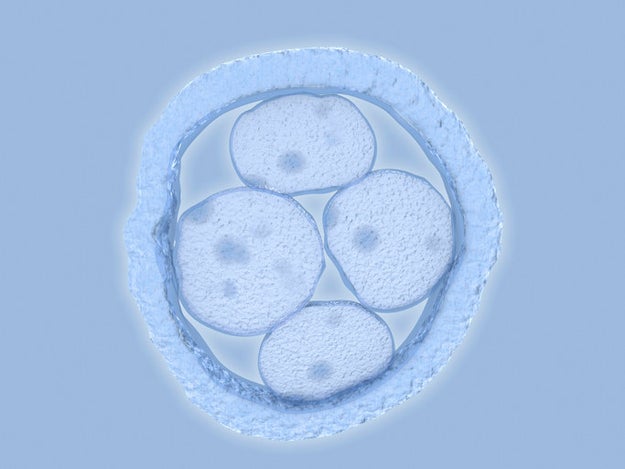 |
| Advertisement |
Chimerism is a rare genetic condition where an individual has two sets of DNA.
Last year, aspiring musician Taylor Muhl learned that the unique birthmark on one side of her torso wasn't just skin-deep. It actually is an outward sign of the fact that she is her own twin, and carries two sets of DNA.
Twins often have an inseparable bond, but Muhl and her fraternal twin are actually the same person. In a rare genetic event, Muhl fused together with her fraternal twin in the womb. So Muhl has two sets of DNA: her own, and her twin's. The condition is called chimerism.
Muhl, a model and an aspiring musician living in California, only learned that she was her own twin after visiting a doctor for health issues. In an interview with People, Muhl said her mother never had an ultrasound and was not aware that she was carrying twins that had fused together in the womb.
Muhl revealed that she was a "chimera" in a post on Instagram last year and appeared in a segment on The Doctors. "I am my own twin [...] I’m a fraternal twin who fused together with my sibling in the womb and carry their genetic makeup within my own body," she wrote on her blog.
Chimerism is a rare genetic condition caused by the fusion of two embryos in the womb.

Juan Gartner / Getty Images / Via gettyimages.com
“In the simplest terms, a chimera is one individual that has the genomes from two different individuals, so they have a mixture of different cells and tissues,” Dr. John Pappas, director of NYU Langone’s Clinical Genetic Services, told BuzzFeed News.
Chimerism occurs when fraternal twins fuse in the womb. “If identical twins fuse, it’s not a chimera because they have the same genome,” Pappas said. When the two sperm fertilize the two eggs, it results in two single-cell organisms (zygotes), which then divide and grow into embryos. In chimerism, these two embryos fuse together into one mass, which becomes one person.
“This happens early in the embryonic life, typically in the first few days of life for the embryos when they are two-cell masses,” Pappas said. If the fusion happens later in embryonic development, Pappas said, one twin may "absorb" the other which results in a teratoma, a type of cyst or tumor that may be benign or cancerous.
“If the fusion happens very early, you can have almost a 50% contribution from each genome, and the later it happens, the less DNA you have from the other fetus,” Pappas said. The earlier the fusion happens, the higher the chances that the fetus will be viable.
Chimerism is very rare. “We don't know exactly but I think the frequency is probably less than 1 in 100,000” Pappas said.
In Muhl's case, she has two separate skin tones on her torso. "The different color pigmentation is my twin’s genetic makeup," she wrote.
Previously, Muhl believed the discoloration on her torso was just a unique birthmark. However, it is actually a physical symptom of her chimerism. “In an individual with two genomic backgrounds, they may have skin that has a different coloration because it originated from one individual,” Pappas said.
Muhl has several other physical abnormalities. “Everything on the left side of my body is slightly larger than the right side. I have a double tooth in the left side of my mouth," she wrote.
However, Muhl’s case is even more rare because most people who are chimeras do not have such an obvious physical difference in traits.
The condition has also caused Muhl to struggle with a number of autoimmune and other health issues.
"I’ve been told I have two immune systems and two bloodstreams," Muhl wrote. The presence of these has led to a number of health problems, which is why Muhl went to a doctor in the first place and was eventually was diagnosed with chimerism.
"My body reacts to my twin’s DNA and cells as foreign matter, compromising my immune system [...] Due to that, I unfortunately suffer with autoimmune and health challenges," she wrote.
If the body has different sets of DNA, this means certain cells will produce slightly different proteins and the body may not recognize them as your own, Pappas said, leading to immune system problems. Muhl also wrote that she has many allergies and sensitivities to various foods, medications, metals, and insects.
Another severe health problem resulting from chimerism occurs when the embryos that fuse together are male and female, so an individual has both XX and XY chromosomes.
“In these chimeras from two different sexes there is a gonadic combination resulting in ambiguous genitalia and they have a higher risk of cancer in the gonads,” Pappas said.
Chimerism can also cause a lot of confusion when it comes to genetic tests for, say, paternity.

Andrew Brookes / Getty Images / Via gettyimages.com
Chimeras can technically have two different immune systems and blood types, Pappas said, which can cause issues with paternity and forensic testing.
There have been cases where paternity tests revealed that a parent with chimerism only shared a small percentage of their biological child’s DNA, as if they were an aunt or uncle, because the child inherited the DNA from the parent’s unborn fraternal twin.
Since certain tissues or organs may be comprised of cells with a different genotype, DNA testing results can differ depending on which part of the body the sample is taken from (i.e. blood, hair, saliva, or fingernails).
Some individuals may never know they have chimerism because the testing is incredibly complicated and expensive.
Since discovering she was a chimera, Muhl has been working to spread awareness about the condition and promote body-positivity.
BuzzFeed News has contacted Muhl for more on her story.


0 comments: